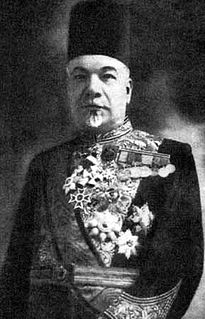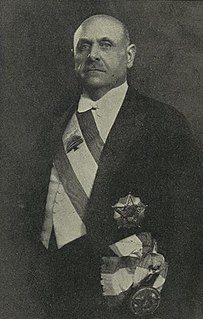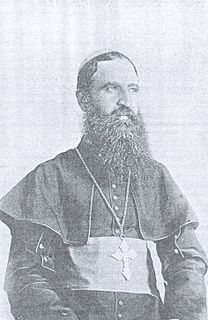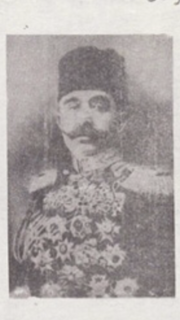 W
WMohammad Ali al-Abed, also known as Mehmed Ali Bey, was appointed the first president of Syria as a nominee of the nationalist Syrian parliament in Damascus after the country received partial recognition of sovereignty from France. France agreed to recognize Syria as a nation under intense nationalist pressure but did not withdraw its troops completely until 1946.
 W
WMar Eliya Abuna of Alqosh was a Bishop of the Assyrian Church of the East and Chaldean Catholic Church.
 W
WAhmed Niyazi Bey, , was an Ottoman revolutionary, who was the bey of the Resne area in the late 19th and early 20th centuries. An ethnic Albanian, Niyazi was one of the heroes of the 1908 Young Turk Revolution and of suppressing the 1909 Ottoman countercoup as he played leading roles in both events. Niyazi is also known for the Saraj, a French-style estate he built in Resne.
Şehzade Ahmed Kemaleddin was an Ottoman prince, son of Sultan Abdulmejid I and his seventh wife Verdicenan Kadın.
 W
WSolomon Eliezer Alfandari, also known as the Saba Kadisha, was a distinguished rabbi, kabbalist and rosh yeshiva in his native home of Constantinople, and later served as Chief Rabbi of Damascus, Syria Vilayet, and Safed, Beirut Vilayet. He was known for his stringent interpretation of halakha and his uncompromising dedication to Orthodox Judaism.
 W
WMoran Mar Ignatius Abded Aloho II Sattuf was the Patriarch of Antioch, and head of the Syriac Orthodox Church from 1906 until his death in 1915.
 W
WIgnatius Aphrem I Barsoum was the 120th Syriac Orthodox Patriarch of Antioch and head of the Syriac Orthodox Church. He wrote, translated and published many scholarly works, including books on the tradition, liturgy, music, and history of Syriac Orthodox Church.
 W
WBekir Fikri (1882–1914), was an Ottoman revolutionary that participated in the Young Turk Revolution (1908) and fought with distinction during the Balkan Wars (1912-1913).
 W
WIsa Boletini was an Albanian commander, guerrilla, politician and rilindas from Kosovo.
 W
WMar Paul II Cheikho † was the patriarch of the Chaldean Catholic Church from 1958 until his death in 1989.
 W
WCharles Debbas was a Greek Orthodox Lebanese political figure. He was the first President of Lebanon and served from September 1, 1926 till January 2, 1934, under the French Mandate of Lebanon. He also served as the Speaker of the Parliament of Lebanon from January 1934 to October 1934.
 W
WBegum Sahiba Hatice Hayriye Ayşe Dürrüşehvar Sultan was the daughter of Abdulmejid II of the Ottoman dynasty, who was the last heir apparent to the Ottoman Imperial throne and the last Caliph of the Ottoman Caliphate. She held the titles of Princess of Berar through marriage, and Imperial Princess of the Ottoman Empire by birth before the monarchy's abolition in 1922.
 W
WÉmile Ibrahim Eddé was a Lebanese Maronite Christian lawyer and politician who served as the President of Lebanon from 1943 to 1952.
 W
WSheikh Bechara Khalil El Khoury was the first post-independence President of Lebanon, holding office from 21 September 1943 to 18 September 1952, apart from an 11-day interruption in 1943. He had previously served two short terms as Prime Minister, from 5 May 1927 to 10 August 1928, and 9 May to 11 October 1929.
 W
WEyüp Sabri, Ohrili Eyüp Sabri (1876-1950) known as Eyüp Sabri Akgöl after the 1934 Surname Law, was an Ottoman-Albanian revolutionary and one of the leaders of the Young Turk Revolution (1908).
 W
WSheikh Pierre Gemayel, also spelled Jmayyel, Jemayyel or al-Jumayyil, was a Lebanese political leader. He is remembered as the founder of the Kataeb Party, as a parliamentary powerbroker, and as the father of Bachir Gemayel and Amine Gemayel, both of whom were elected to the Presidency of the Republic in his lifetime.
 W
WAtıf Kamçıl, also known as Atif Bey, Atif Efendi (1880–1947) was an Ottoman revolutionary and Turkish politician.
 W
WMoran Mor Ignatius Abded Mshiho II was the Patriarch of Antioch, and head of the Syriac Orthodox Church from 1895 until his deposition in 1903.
 W
WTraianos Nallis was an important Greek notable and politician.
 W
WNazperver Kadın was the fourth wife of Sultan Mehmed V of the Ottoman Empire.
 W
WNene Hatun was a Turkish folk heroine, who became known for fighting against Russian forces during the recapture of Fort Aziziye in Erzurum from Russian forces at the start of the Russo-Turkish War of 1877–1878.
 W
WGabriel (Kapriel) Efendi Noradunkyan was an Ottoman Armenian statesman and bureaucrat. He served as the Minister of Trade in 1908 and Minister of Foreign Affairs of the Ottoman Empire from July 22, 1912 to January 23, 1913 during the reign of Mehmed V and the prime ministership of Ahmed Muhtar Pasha and Kâmil Pasha.
 W
WAristotle Socrates Onassis, commonly called Ari or Aristo Onassis, was a Greek shipping magnate who amassed the world's largest privately owned shipping fleet and was one of the world's richest and most famous men. He was married to Athina Mary Livanos, had a long-standing affair with famous opera singer Maria Callas and was married to Jacqueline Kennedy, the widow of American President John F. Kennedy.
 W
WReshid Akif Pasha, was an Ottoman statesman during the last decades of the Ottoman Empire. Throughout his career as a politician, Reshid Akif Paşa served as governor, minister of the interior, and in the Council of State. He is also noted for providing important testimony in the aftermath of the Armenian Genocide.
 W
WPeruz also known as Peruz Hanım or Kantocu Peruz, Perviz Hanım was an Ottoman Armenian kanto singer, songwriter. Her family name was Terzakyan. One of her nicknames was Afet-i Devran Peruz.
 W
WLoukas Petridis was an Ottoman Greek priest, monk and Metropolitan bishop of the Ecumenical Patriarchate of Constantinople.
 W
WMar Ignatius Dionysius Ephrem II Rahmani was Patriarch of the Syriac Catholic Church from 1898 to 1929 and a Syriac scholar.
 W
WRexhep Pasha Mati was an Ottoman-Albanian Marshal, governor and war minister.
 W
WRukiye Sabiha Sultan was an Ottoman princess, the daughter of Sultan Mehmed VI and his first wife Nazikeda Kadın. She was the first wife of Şehzade Ömer Faruk, son of the last Caliph of the Muslim world, Abdulmejid II and Şehsuvar Hanım.
 W
WŞehzade Ömer Faruk was an Ottoman prince, the son of last caliph of Muslim world Abdulmejid II and Şehsuvar Hanım. He was the imperial son-in-law of Sultan Mehmed VI of the Ottoman Empire.
 W
WShemsi Pasha (1846-1908) was an Ottoman-Albanian General.
 W
WMehmet Şerif Pasha, a founding member of Kurd Society for Cooperation and Progress and representative of the Society for the Elevation of Kurdistan to the Paris Peace Conference (1919–1920). He was a leading Kurdish nationalist.
 W
WKamil Tolon was a Turkish businessperson, industrialist, and inventor.
 W
WShevket Turgut Pasha was an Ottoman army general with the rank of mirliva, who also held the governmental title of pasha (lord). He went to the Prussian military school.